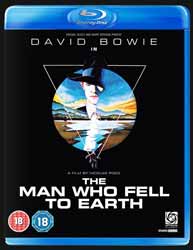|
Click here to return to the main site. Blu-ray Review
Walking out of the arid wilderness of the New Mexico border, Thomas Jerome Newton waits for a pawn shop to open so that he can trade in a gold ring in for money. The ring is one of many which provide him with enough money to, eventually, create a mega-corporation, whose final goal is to build a spaceship. Newton’s innate innocence is corrupted by the America he finds himself in, a corruption which eventually twists and nearly destroys him... The Man Who Fell to Earth (1976 - 2 hrs, 18 min, 54 sec) is a science fiction film directed by Nic Roeg. Paul Mayerberg wrote the screenplay based on the original novel by Walter Tevis. The film won one award for Bowie’s acting and was nominated for a further three, which is odd given how good it is. The first thing that you have to come to terms with is that this is a Nic Roeg film and it has his finger print all over it, with signature motifs like nonlinear time and allusions galore. And, like many of his films, this is nearly, but not quite, a classic. Ambiguity plays a part in the film, with many reviews stating that Newton isn’t even an alien but rather a normal, if delusional, man. A theory which would hold water if he didn’t come up with such advanced technology, that he effectively tops the biggest corporations in America in very little time. It has to be admitted that some of the visual allusions used in the film are a little heavy handed, especially Brueghel’s painting of 'Landscape with the Fall of Icarus'. This is at odds with the novel's fairly straightforward narrative. Although fairly faithful to the original, there were a number of changes made to the story when it was adapted, with scenes added and plot points made deliberately obscure - the most bizarre being Newton’s purpose on Earth. The film alludes to, but never directly states, that he is building his spaceship to carry water to his drought ridden world, an absurd change given the amount of water that he was likely to have been able to carry. In the original novel his planet has only a few hundred survivors, though in the film we only see Newton’s wife and two children tottering, somewhat embarrassingly, about on an arid landscape. Presumably it would have made more sense to try and rescue them rather than spend three years building a craft capable of the stars and only turning up with a glass of water. The central theme of the film is alienation and, as we see through Newton’s eyes, we ourselves become the central aliens. Frail, intellectual and blessed with great longevity, Newton witnesses first the fragility of human life before being drawn and corrupted by human culture. The catalyst for this is his accidental meeting with Mary-Lou (Candy Clark), a gin sodden maid, in a hotel he stays at, who introduces him to not only religion but more importantly alcohol. Newton is nearly consumed by the culture as he consumes ever greater qualities of gin. Ultimately, he is betrayed by both Mary-Lou and his only other friend Nathan Bryce (Rip Torn), when the government, does what all good American governments do to aliens in films, detains and experiments on him. Although the script may have faltered in places, the same cannot be said of the actors. David Bowie is the perfect Newton. With the central character's isolation, born out of his power and wealth, seeming to mirror Bowie's own life, at that time. Both his accent and his physicality set him apart from the other characters to be a stranger in a strange land. Candy Clark and Rip Torn both put in good performances as does Buck Henry as Oliver Farnsworth his patent lawyer. Whatever you make of the plot, the cinematography of Anthony B. Richmond remains arresting. Originally Bowie was to do the soundtrack and was even paid, but it never happened and the remaining work became side two (for those of us who remember records) of his album Low. The version on the Blu-ray is the complete film and not the edited down version which was original shown in America, where twenty-three minutes were cut. The picture has been restored, producing a sharper image with fine blacks and accurate flesh tones. Given the age of the film there is some evident grain which was probably there in the original print, so cannot be considered a fault. Audio is a clear, but disappointing, Stereo 2.0. There is a decent set of extras, especially if you haven’t bought the film before, which starts with a set of interviews with Nic Roeg (33 min, 27 sec), Anthony Richmond (21 min, 48 sec), Paul Mayerberg (31 min, 50 sec), Candy Clark (27 min, 48 sec) and an audio interview with novelist Walter Tevis (4 min, 10 sec). The documentary Watching the Alien (24 min, 27 sec) covers much of the history of the film and the disc wraps up with the original theatrical trailer (2 min, 20 sec). Due to its structure and lack of easy answers, the film tends to divide audience into one camp which thinks that the film is overblown and pretentious and another which feels that it is a little, almost perfect, gem. I tend to fall into the second camp. Like his other movies, Roeg does not appear to be interested in just providing vacuous entertainment, but requires that his audience do some work as well. If you’re willing to do this, you’ll find the film a very rewarding experience. 9 Charles Packer |
|---|

